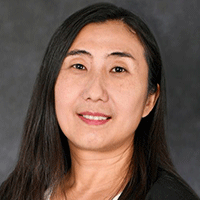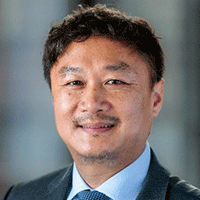
Tuesday, July 8th, 2025
Ying Sun, Ph.D.
Herman Schneider Professor
Department of Mechanical and Materials Engineering
University of Cincinnati
Keynote Title: Data-Driven Innovation in Multiphase Transport for Sustainable Energy Systems
Abstract: Harnessing AI and data science offers a transformative pathway to accelerate discovery and innovation of energy systems. From advanced modeling of transport phenomena and materials discovery to digital twins and extended reality, these tools enable the rapid development of next-generation solutions for batteries, electronics cooling, data centers, nuclear energy, and quantum computing, where energy efficiency and security is critical. Integrating multiphysics modeling with surrogate models, physics-informed AI, and hybrid approaches dramatically reduces computational cost while preserving accuracy, enabling efficient design space exploration. AI-driven inverse design further expands opportunities for system-level optimization under complex real-world constraints. This talk presents examples of machine learning, spanning supervised, unsupervised, generative AI, physics-informed, and reinforcement learning, to enhance the understanding and design of multiphase transport processes across energy-intensive systems that support emerging industries in AI, quantum information science, and nuclear energy. The presentation also highlights the importance of building domain-specific data infrastructure to unify experimental data, high-fidelity simulations, and data-driven models, paving the way for more robust and scalable energy solutions.
Biography: Dr. Ying Sun is the Herman Schneider Professor in Mechanical Engineering and the Director of Research and Strategic Initiatives in the College of Engineering and Applied Science at the University of Cincinnati. She served as Head of the Department of Mechanical & Materials Engineering at the University of Cincinnati and as Program Director of the Thermal Transport Processes Program at the National Science Foundation. Her research interests span multiphase flows and heat/mass transfer, complex fluids and interfacial phenomena, machine learning and data-driven methods, and multi-scale modeling. Dr. Sun is an elected Fellow of APS and ASME and a recipient of the NSF CAREER Award, AFOSR Summer Faculty Fellowship, CNRS Visiting Professorship, and Drexel College of Engineering Research Achievement Award. She serves as an Associate Editor for the Journal of Heat and Mass Transfer and has been a visiting professor at Princeton University, Ecole Polytechnique, and Tsinghua University. Dr. Sun recently co-chaired the 2025 Gordon Research Conference on Micro and Nanoscale Phase Change Phenomena and leads an NSF REU Site on American Leadership of Industry with Zero Emissions.

Wednesday, July 9th, 2025
Junhong Chen, Ph.D.
Crown Family Professor of Molecular Engineering
University of Chicago
Lead Water Strategist and Senior Scientist
Science Leader for Argonne in Chicago
Argonne National Laboratory
Keynote Title: The Circular Water Economy: Addressing the Global Water-Energy Nexus Challenge
Abstract: The global demand for freshwater continues to rise due to economic growth and urbanization, while available supplies are increasingly limited, resulting in heightened water stress worldwide. At the same time, water and energy are deeply interconnected: water is required for energy production, and energy is needed for water production. In the U.S., municipal wastewater treatment alone consumes approximately 3% of the nation’s electricity, yet only about 10% of the treated water is recovered and reused. To address these challenges, this presentation proposes a circular water economy vision that optimizes the water-energy nexus by recovering and reusing critical resources—such as critical minerals, nutrients, organics, and freshwater—for sustainable purposes. A key enabler of this circular economy is the availability of low-cost, real-time water quality monitoring. Current detection methods for critical water contaminants are often expensive or unsuitable for in-situ, real-time analysis. To overcome these limitations, this talk will introduce an innovative approach for real-time water sensing, leveraging the molecular engineering of 2D nanomaterials in a field-effect transistor (FET) platform. The sensor works by detecting changes in the electrical conductivity of the 2D nanomaterial channel, which occurs when chemical or biological species bind to molecular probes anchored on the nanomaterial’s surface. This enables precise detection of a wide range of analytes—including PFAS, heavy metals, bacteria, and nutrients—by measuring changes in the sensor’s resistance. This patented technology offers a powerful solution for real-time detection of contaminants with high sensitivity and selectivity, suitable for both one-time testing and continuous, in-line monitoring in field settings. The presentation will explore the molecular engineering behind this sensor, focusing on the design of the nanomaterial channel and the molecular probes, through both theoretical models and experimental results. Finally, the talk will conclude with a discussion on the translation of this platform from concept to prototype product, highlighting industry partnerships that are driving its commercial development.
Biography: Junhong Chen is currently the Crown Family Professor of Pritzker School of Molecular Engineering at the University of Chicago and Lead Water Strategist & Senior Scientist at Argonne National Laboratory. He also serves as the Science Leader for Argonne’s presence in the City of Chicago (Argonne in Chicago). Since March 1, 2024, Dr. Chen has been serving as the Co-PI and Use-inspired R&D Lead for the NSF Great Lakes ReNEW Water Innovation Engine. Prior to coming to Chicago, Dr. Chen served as a program director for the Engineering Research Centers program of the US National Science Foundation (NSF) and the director of NSF Industry-University Cooperative Research Center (I/UCRC) on Water Equipment & Policy (WEP). He founded NanoAffix Science LLC to commercialize real-time water sensors based on 2D nanomaterials. Dr. Chen received his Ph.D. in mechanical engineering from University of Minnesota in 2002 and was a postdoctoral scholar in chemical engineering at California Institute of Technology from 2002 to 2003. His current research focuses on nanomaterial innovation for sustainable energy and environment. Dr. Chen has published 300 journal papers and has been listed as a highly cited researcher (top 1%) in materials science/cross-field by Clarivate Analytics. He is an elected fellow of Royal Society of Chemistry, National Academy of Inventors, and the American Society of Mechanical Engineers.

Thursday, July 10th, 2025
Jason Woods, Ph.D.
Sr. Research Engineer
National Renewable Energy Laboratory (NREL)
Keynote Title: Air Conditioning in Buildings: Challenges and New Approaches
Abstract: This presentation explores the longstanding challenge of air conditioning for buildings. It begins with an overview of the vapor compression cycle—a 150-year-old technology used in most air conditioning systems—and the key barriers to enhancing its performance. It also discusses the impact air conditioning has on global energy use and the challenges it makes for the electric grid. The talk then briefly reviews various options for improving vapor compression efficiency, with a particular focus on dehumidification. It will then discuss open-absorption cooling systems, which offer a novel approach for efficient air conditioning and enables inherent energy storage.
Biography: Dr. Jason Woods is a Distinguished Researcher in NREL’s Advanced Building Equipment Research Group. His expertise is in heat and mass transfer and phase change processes, with applications to air conditioning, heat pumps, thermal energy storage, and dehumidification. He leads projects at NREL that connect system-level modeling with technology development and experimental research. Dr. Woods has 96 publications and has been issued 12 US patents in building HVAC-related technologies, with one of these receiving an R&D100 Award.